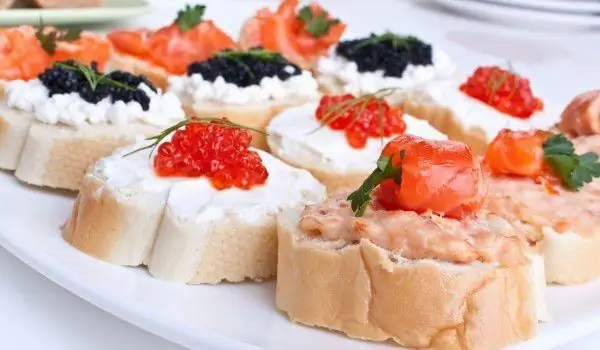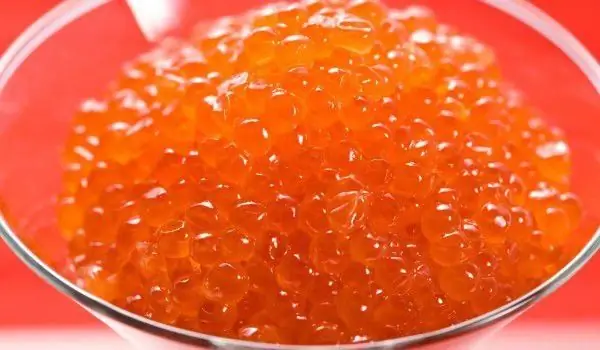2025 Author: Jasmine Walkman | [email protected]. Last modified: 2025-01-23 10:18
The caviar is the name of the set of eggs of a given species of fish. Most fish caviar has spherical eggs, others are elliptical and some are even conical. The caviar has a membranous shell, which in many species is equipped with many different growths. The size of the caviar grains varies from 0.6 to 1.3 mm. Caviar is widely used in cooking, black and red caviar are considered a luxury food, a delicacy and are quite an expensive pleasure.
Along with truffles, caviar has the reputation of being one of the most expensive foods. The roots of this fact should probably be traced back to the antiquities of history, when caviar was specially kept for the royal table. Nowadays, caviar is synonymous with exquisite hors d'oeuvres. Premium caviar should be stored with special care because it spoils easily.
Of the 24 sturgeon species that exist, five live in the Caspian Sea. Only four of them produce edible caviar (the most famous species of which is the beluga). The caviar extraction process is also extremely delicate. It is important that the fish is not killed, because in this case it releases a bitter secretion that ruins the taste of the caviar. To avoid this effect, the fish is put to sleep with a light blow behind the head and in the next ten minutes the caviar must be removed and packed in metal cans.

An important feature of caviar is that it cannot retain its taste if it is not stored properly in metal boxes. The price in Europe for caviar of farmed fish is about 1,443 euros per kilogram, and natural beluga caviar reaches about 2,103 euros per Iranian beluga. The price depends on the size of the fish eggs. Black caviar is much more expensive because it is more difficult to access than red. The minimum price of real black caviar should be not less than BGN 3000-4000 per kg.
Composition of caviar
Caviar is considered the most nutritious fish delicacy. It contains only 270 calories per 100 g, which makes it low in calories. 100 g of caviar contains 25.3 g of protein, 17 g of fat, 4 g of sugar, 440 mg of cholesterol. The nutrients of the caviar include:
sodium (1.7 g)
phosphorus (330 mg)
potassium (164 mg)
calcium (51 mg)
vitamins D, A, C, B2, B44 and B12
Types of caviar
The most popular are salmon caviar - red caviar, considered one of the most exquisite delicacies, as well as sturgeon caviar - black caviar, reaching record prices. There are three main types of red caviar: catfish, salmon and sockeye caviar.
Catfish caviar has the largest grains - 4-5 mm, light orange color, good aroma, delicate, slightly watery taste. Suitable for sandwiches and sauces. The salmon caviar has a medium grain size, about 3-3.5 mm, deep orange in color with harder grains than catfish. It has a strong caviar aroma and rich taste.
It goes perfectly with hot pancakes and is widely used in Japanese and Italian cuisine. The sockeye caviar has the smallest grains - about 3 mm. It has a pronounced bright red color and an extremely pronounced aroma of caviar and a slightly bitter taste. It goes perfectly with vodka, and in Western Europe and the United States it is considered the most refined and expensive.
Selection and storage of caviar

Salting caviar must have well-defined grains. When cleaning the fish, the caviar is removed, washed well, then drained thoroughly and its skin carefully removed. To preserve the caviar, use a jar in which salt is placed, caviar on top, again salt, caviar and so observing the ratio of salt. caviar 1: 1. It is important to seal well so that no air enters.
Thus preserved caviar matures well after 2-3 weeks to a month. The best indicator of its readiness is the orange color. An additional plus is that it is prepared this way caviar can withstand refrigeration with salt for up to 1 year. Large hypermarket chains offer ready-made salted caviar for breaking, in case you do not have fresh fish on hand.
Caviar in cooking
Caviar is an excellent appetizer, in the form of prepared tarama caviar spread on slices of toast, or just broken caviar, ideal as a snack. In addition, the caviar can be breaded, fried, added to fish soups or broths, or on bites, as well as made into caviar meatballs. Broken caviar is high in calories. Like most fish dishes, caviar goes well with white wine or vodka.
Broken tarama caviar is prepared in many ways - with semolina or potatoes instead of bread, with garlic or onion, with parsley, egg yolks, with the addition of smoked salmon, crab rolls, shrimp, etc. The weight of the caviar is according to personal preferences, and the addition of more oil makes it fluffier. Tarama bread caviar must be white or for a toaster. An important condition is that it is well dried, because the soft bread will turn into a ball of dough, which you will break hard and will transfer the stickiness of the caviar.
The addition of salt is not necessary, because the caviar is salty enough during storage. It is possible to grind the caviar with a spoon, but the best option is to use a blender or mixer. When tarama caviar is beaten in a blender, a homogeneous mixture such as mayonnaise is obtained. If you want to get tarama caviar in which to feel the individual balls of caviar, you can break it into a convenient large bowl with a mixer or a wooden spoon.
Russian caviar is considered to be the best, tastiest and most expensive in the world. The most valuable are the caviar of beluga, sturgeon and sturgeon, named after the respective Russian names of sturgeon species. Significant catches of this fish take place in the northern parts of the Caspian Sea. It is also considered one of the most environmentally friendly.

After Russian caviar, Iranian caviar ranks second in quality and price. It is produced from the same fish, but in the southern parts of the Caspian Sea and is not so popular. Apart from Russia and Iran, caviar produced by other countries. France is one of the largest producers of caviar from an artificial water source. The most famous is the Gironde region, which has lost its fish as a natural species due to the over-exploitation of sturgeon. Other caviar-exporting countries are Sweden, Hungary and the United States.
The refined manner of serving caviar prescribes it to be served surrounded by pieces of ice and with a golden, horned, pearl or wooden spoon. Silver is never used because this metal changes the taste of the caviar. Connoisseurs try the caviar in small quantities and without garnish such as lemon, onion, pepper or any spices. Following the Russian tradition, the most suitable drink for caviar is chilled vodka, which according to the American model is modified into dry champagne.
Benefits of caviar
Caviar is defined as one of the most nutritious products, and in terms of calories it is superior to milk, meat and many foods. Caviar is rich in organic compounds vital to the human body. Caviar has been scientifically proven to help normalize blood pressure and increase hemoglobin. Omega-3 and omega-6 polyunsaturated acids help improve brain activity, have a strong anti-allergic effect, improve blood circulation and reduce the risk of cardiovascular disease.
It should be noted that caviar is considered an aphrodisiac № 1, easily surpassing oysters, strawberries, chocolate, etc.
Recipes with caviar
A classic recipe for broken caviar is prepared from:
caviar - 3 tbsp.

oil - 400 ml
water - 150 ml warm
lemons - juice of 1/2
onion -1 head mashed or grated
bread - 2-3 slices dry, only the middle
The bread is broken and moistened slightly with running warm water. The caviar is added to it and beaten with a blender. Gradually add about 20-30 ml of oil. After 3-4 times adding oil, pour a little water, oil again. Finally, add the lemon juice and chopped onion. The caviar must be well ripened.
The ingredients for the original tarama caviar are: 100-120 g of pre-salted caviar, 500-700 ml of oil, 1 piece of dry white bread, the juice of 1 lemon, 1/2 grated onion. Tarama salad is also prepared from 100 g of white or red tarama, the middle of 1 white bread (700 g), 50 ml of olive oil, 2 cloves of garlic or 1 onion, as well as the juice of 1 lemon. If desired, 1/2 kg of boiled potatoes can be added.
Recommended:
Black Caviar

Black caviar is one of the most expensive foods in the world, which is why it is no coincidence that it is called the food of kings. This type of caviar is a symbol of luxury and abundance and is often likened to black diamonds. Black caviar is harvested only from the sturgeon family.
How To Consume Caviar

Caviar was once a very rare and special food consumed only by royalty and the elite of society, but today it is easily available to the table of the mass consumer. Despite its availability in stores, its unique taste can be a real challenge when you try it for the first time.
Myths And Truths About Caviar

Caviar is not only very tasty, but also a very useful product. It is also quite an expensive pleasure, which leads to a huge amount of dubious caviar on the stands. It is important to know how to make your choice. One of the most common myths about caviar is that black is more useful than red.
On Caviar Day: See The Most Interesting Facts About The Delicacy

Today - July 18th , there is a special holiday the caviar . That's why we share with you interesting facts for the delicious delicacy. The simple description of caviar in encyclopedias of sturgeon caviar or other large fish fails to convey the splendor and luxury that accompanies this world-famous delicacy.
Snail Caviar - The Last Scream In Expensive London Restaurants

Snail caviar is the latest scream in gourmet fashion to make a real boom in Paris and London, culinary experts predict. The idea for the snail caviar trade belongs to Dominic and Sylvie Pierre, a couple who own a snail farm in the Picardy region of France.

